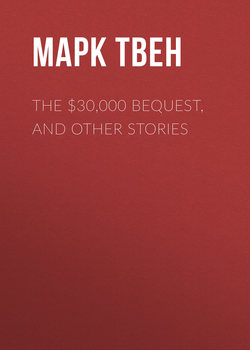Читать книгу The $30,000 Bequest, and Other Stories - Марк Твен, ReadOn Classics, Charles Dudley Warner - Страница 22
A CURE FOR THE BLUES
ОглавлениеBy courtesy of Mr. Cable I came into possession of a singular book eight or ten years ago. It is likely that mine is now the only copy in existence. Its title-page, unabbreviated, reads as follows:
“The Enemy Conquered; or, Love Triumphant. By G. Ragsdale McClintock, (1) author of ‘An Address,’ etc., delivered at Sunflower Hill, South Carolina, and member of the Yale Law School. New Haven: published by T. H. Pease, 83 Chapel Street, 1845.”
No one can take up this book and lay it down again unread. Whoever reads one line of it is caught, is chained; he has become the contented slave of its fascinations; and he will read and read, devour and devour, and will not let it go out of his hand till it is finished to the last line, though the house be on fire over his head. And after a first reading he will not throw it aside, but will keep it by him, with his Shakespeare and his Homer, and will take it up many and many a time, when the world is dark and his spirits are low, and be straightway cheered and refreshed. Yet this work has been allowed to lie wholly neglected, unmentioned, and apparently unregretted, for nearly half a century.
The reader must not imagine that he is to find in it wisdom, brilliancy, fertility of invention, ingenuity of construction, excellence of form, purity of style, perfection of imagery, truth to nature, clearness of statement, humanly possible situations, humanly possible people, fluent narrative, connected sequence of events – or philosophy, or logic, or sense. No; the rich, deep, beguiling charm of the book lies in the total and miraculous absence from it of all these qualities – a charm which is completed and perfected by the evident fact that the author, whose naive innocence easily and surely wins our regard, and almost our worship, does not know that they are absent, does not even suspect that they are absent. When read by the light of these helps to an understanding of the situation, the book is delicious – profoundly and satisfyingly delicious.
I call it a book because the author calls it a book, I call it a work because he calls it a work; but, in truth, it is merely a duodecimo pamphlet of thirty-one pages. It was written for fame and money, as the author very frankly – yes, and very hopefully, too, poor fellow – says in his preface. The money never came – no penny of it ever came; and how long, how pathetically long, the fame has been deferred – forty-seven years! He was young then, it would have been so much to him then; but will he care for it now?
As time is measured in America, McClintock’s epoch is antiquity. In his long-vanished day the Southern author had a passion for “eloquence”; it was his pet, his darling. He would be eloquent, or perish. And he recognized only one kind of eloquence – the lurid, the tempestuous, the volcanic. He liked words – big words, fine words, grand words, rumbling, thundering, reverberating words; with sense attaching if it could be got in without marring the sound, but not otherwise. He loved to stand up before a dazed world, and pour forth flame and smoke and lava and pumice-stone into the skies, and work his subterranean thunders, and shake himself with earthquakes, and stench himself with sulphur fumes. If he consumed his own fields and vineyards, that was a pity, yes; but he would have his eruption at any cost. Mr. McClintock’s eloquence – and he is always eloquent, his crater is always spouting – is of the pattern common to his day, but he departs from the custom of the time in one respect: his brethren allowed sense to intrude when it did not mar the sound, but he does not allow it to intrude at all. For example, consider this figure, which he used in the village “Address” referred to with such candid complacency in the title-page above quoted – “like the topmost topaz of an ancient tower.” Please read it again; contemplate it; measure it; walk around it; climb up it; try to get at an approximate realization of the size of it. Is the fellow to that to be found in literature, ancient or modern, foreign or domestic, living or dead, drunk or sober? One notices how fine and grand it sounds. We know that if it was loftily uttered, it got a noble burst of applause from the villagers; yet there isn’t a ray of sense in it, or meaning to it.
